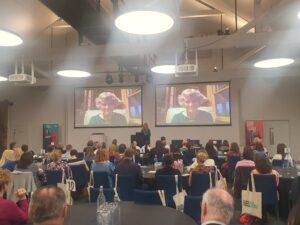Net zero is ‘opportunity to improve care’, say nurse leaders

Nurses and midwives must lead the push for a more sustainable health service, according to some of the profession’s most senior figures.
Chief nursing officer (CNO) for England Dame Ruth May, and other top-ranking nurses across the UK and from overseas, came together today to encourage nurses to lead public health improvements with the goal of decarbonising the health service.
“Together, the global nursing community has got this”
Teddie Potter
The remarks were made at the Florence Nightingale Foundation (FNF)’s annual scholars conference in London, which focused this year on sustainability.
At the event, graduates from the FNF scholarship programme received their awards, presented their patient quality improvement projects and heard from senior nurses about their future priorities.
Dr Teddie Potter, director of planetary health for the University of Minnesota’s nursing school, spoke about a need for a “great transition” for rapid and structural change across all aspects of human life – including health.

Teddie Potter (on screen)
“Healthcare has been told to commit to being nature positive and carbon neutral before 2040 globally,” Dr Potter said.
“We need to strengthen our resilience and understand that we are part of the global solution.”
Dr Potter added: “Equity must be at the centre of our thinking.”
She said her organisation believed public health was the most important thing that must improve to make health more sustainable, pointing to improvements like more green spaces, access to air and clean water, nutrition, and culturally-appropriate public health access.
“I see nursing all over this,” said Dr Potter. “[Nurses] have always promoted a healthcare system, rather than an illness system.
“Nurses have always understood that people need access to parks, that we need healthy food and clean air, clean water. We’re wonderful at advocating for a health system which works for everyone.”
Dr Potter said that a push for improving healthcare sustainability was “nurses’ moment to shine”.
She added: “Together, the global nursing community has got this. We can create a heath environment that is necessary for a healthy future. The future is going to be bright.”
Paul Labourne, nursing officer for the CNO Wales office, told the conference about the work being done in Wales to decarbonise the health service.
He highlighted that Wales has a government-imposed net zero ambition for the health service there by 2030, and mentioned a “strong push” by frontline nurses for sustainability.

Paul Labourne, nursing officer for CNO Wales
Mr Labourne mentioned four principles that Welsh nursing was focusing on to improve sustainability in healthcare: prevention, patient self-care, efficiency, and low-carbon alternatives.
“Why nurses? Why not,” he said. “Think what reach we have as nurses, if we were to make one small change in our practice, and do it across all of nursing and social care, think of how big of an impact that would have.
“We see the patient journey, 24/7, cradle to grave, we are there. We can change clinical pathways, nurses are great at adopting change and being clinical leaders,” he said.
Mr Labourne noted that, in Wales, a “triangle” method was being used which better allow nurses at non-management levels to offer ideas which could then be rolled out nationally: local innovations are at the “base” of the triangle, followed by a regional model if successful, and then a national model from there.
Examples from the country where this has been successfully done included a campaign to reduce disposable glove usage, other single use plastic reduction, and electronic scheduling for social care – which massively reduced the number of miles that social care nurses were travelling per patient, while increasing the number of patients seen.
Lucy Brown, director of nursing and midwifery leadership development for FNF, said her own organisation – with support from Nuffield Health – was proof of the ability of nurses to lead on sustainability improvements.

Lucy Brown
A Nuffield-sponsored FNF cohort of 20 nurses, including 18 working in frontline roles at band 5 or 6, saved around 6,280 tonnes of carbon over six months with small changes in their wards.
Ms Brown referred to one nurse in the cohort, who reduced her ward’s carbon footprint by thousands of tonnes worth by approaching the manufacturer of its single-use procedure packs.
These packs previously included 30 pieces of single-use equipment, which were often all disposed of after a procedure, even though a majority was not used.
The nurse’s intervention led to the 30 pieces of equipment being reduced to eight, and she went on to oversee the replacement of plastic dressing drays with a biodegradable alternative.
“We have an absolute obligation to lead this change,” said Ms Brown. “This isn’t an add on, this isn’t a nice-to-do.
“It starts with us nurses – 18 frontline nurses saved 6,270 tonnes of carbon; there are millions of us in the world, imagine what we could all do together.”
At the event, newly-graduated FNF scholars also highlighted projects they were doing – with many referring to sustainability work.
Dame Ruth said she wanted the FNF scholar nurses to have two goals in mind, one of which was to help a nurse from the global south, honouring Black History Month which is celebrated across October.
The second, she said, was about sustainability. “I want you to personally support the journey of someone from the global majority to more senior post,” said the CNO for England.
“The other thing is following your leadership, what you personally will do to support the sustainability agenda,” added Dame Ruth.
Dr Emma Pascale Blakey, who leads the CNO office’s sustainability directorate, described climate change as a “public health emergency” and that, without interventions from nurses, it would worsen health inequalities.

Emma Pascale Blakey
She referred to writing by Florence Nightingale about the necessity for good public health – and for an understanding that humans are part of nature.
“It’s something we’re all aware of without specifically talking about it,” she said. “Colleagues in psychiatric units who bring people out on walks in green spaces, or who run out to get some respite.
“This is a patient safety issue, and for us, as nurses and midwives, it’s a priority and we should and can embed sustainability.”
Dr Blakey agreed that nurses should be at the forefront of improving sustainability in the NHS.
“We are part of a system which contributes to the creation of carbon, and we are in an ideal place to reduce the amount we produce,” she said.
“Carbon impact increases when care is complex, or if it is inefficient. And we should embed sustainability as business as normal. There are benefits to this.”
She pointed to the connection between efficient care, a reduction of carbon, and lower waiting times for patients and faster turnaround speeds.
“Climate change is a public health and a patient safety issue,” Dr Blakey added. “Net zero ambitions provide opportunities to improve care.”







